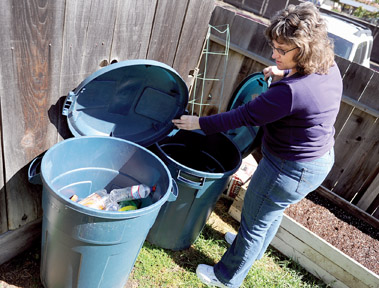
Regional grant provides outreach to jump start programs
Tracy Sullivan has always recycled plastic and glass bottles,
and aluminum cans at her Villa Luna Apartment in Hollister. But
thanks to the Monterey Bay Area Regional Multifamily Recycling
Project, she and many of her neighbors are now recycling cardboard,
newspapers and many of the plastic containers in which food or
other items come.
She has trash cans in her backyard that she uses to sort out the
items that she takes in for cash, such as cans and bottles. But now
she has two small blue bins in her kitchen that fill up with paper
and other plastic waste.
Regional grant provides outreach to jump start programs
Tracy Sullivan has always recycled plastic and glass bottles, and aluminum cans at her Villa Luna Apartment in Hollister. But thanks to the Monterey Bay Area Regional Multifamily Recycling Project, she and many of her neighbors are now recycling cardboard, newspapers and many of the plastic containers in which food or other items come.
She has trash cans in her backyard that she uses to sort out the items that she takes in for cash, such as cans and bottles. But now she has two small blue bins in her kitchen that fill up with paper and other plastic waste.
“It’s small enough, the kids can take it out,” she said. “I just tell them to make sure not to go in a full bin.”
Ecology Action, a nonprofit advocacy group from Santa Cruz County, received a three-year grant that is coming to completion in June to address recycling in multifamily residences. Staff members from Ecology Action have worked with waste management agencies, haulers who collect trash and recyclables, and property managers to implement recycling programs where none existed.
The grant was originally given to do outreach on recycling to low-income multifamily complexes in Monterey and Santa Cruz counties. San Benito was eventually added to the project, and the range increased beyond low-income complexes.
Matthew Greenfield, the media program specialist for Ecology Action, said the focus of the grant came about because while 70 percent of single-family homes in California recycle, only 40 percent of multifamily homes do.
Since she started using her bins, Sullivan said her family has to empty them three times a week. She said her waste items are about 50 percent recyclables and 50 percent trash.
“Almost everything you throw away can be recycled,” she said.
Overall, the outreach team met with residents from 290 complexes in Monterey, Santa Cruz and San Benito counties. Of those visited, 161 multifamily sites, including complexes in Hollister and San Juan, implemented programs where none existed.
In San Benito, the team visited 42 facilities and has implemented the program with 523 units (apartments or townhomes.) They still have 25 more facilities to visit before the grant is completed in June.
“The primary mission was an educational mission and supplying the tools,” Greenfield said. “With the grant funding we were able to get tons of recycle bins and put stickers about what is recyclable.”
Greenfield talked about how new concepts take root, such as the idea of recycling.
“It starts with innovators and early adopters,” he said. “They are all about recycling and they know everything about recycling. Then it goes to the early majority and the late majority and then the laggers. These are people who really don’t know about it and how to do it.”
Gavin Comstock, a bilingual outreach coordinator with Ecology Action, went out with other staff members to the complexes where they talked to property managers about putting recycle bins in the trash areas. Each property manager received a 26-page booklet about recycling and waste reduction to help them answer any questions residents might have. They handed out fliers in English and Spanish that explained what can be put in the blue bins and what should go in the trash. It even has graphics that show how to dispose of items, such as flattening cardboard packages and putting bundles of plastic bags inside another bag so they are not likely to fly loose. They spent $28,000 of the grant on materials for San Benito County along with in-kind donations.
“I had contact with individuals like Maria (Salazar, the property manager for the Villa Luna Apartments) to see what would work with residents,” Comstock said. “On site one factor was education and the other was having enough infrastructure.”
Maintenance crews at Villa Luna Apartments expanded some of the trash areas to accommodate blue recycle bins that came from Recology, the local company that collects trash and recyclables.
Lisa Jensema, of San Benito County Integrated Waste Management, worked with members of Ecology Action as well as Julie Alter, of Recology, to identify properties and implement the program. Outreach workers visited the complex three times.
“Just being able to participate – that really gave us the fuel to really go hit complexes in large numbers,” Jensema said. “Without help and funding, to make the success we had with this regional grant would have been extremely difficult.”
Hortencia Lezama, another resident, has been using the bins provided by Ecology Action. Speaking Spanish, she said through a translator, that the stickers on the bins in the trash area make it easy to sort the recyclables. She said her children are also learning how to recycle and that she has shared information with other residents about the program.
“It’s easy for the kids and it’s a way to help have a better environment,” she said.
In complexes where a recycling program was implemented, recyclables went from 3 percent of the waste stream to 23 percent.
Salazar, the property manager, said that she has seen a lot of residents using the bins.
“It helped also for myself to have an idea, ‘Can this be recycled?'” she said. “People have been using them.”
The efforts of Ecology Action come as Assembly Bill 818 is making the rounds at the state Capitol. The bill would require that owners of multifamily dwellings arrange appropriate recycling services for their properties. Similar bills in the past were vetoed by then-Gov. Arnold Schwarzenegger.
“It sort of shows that communities, cities and counties, and haulers are working to make it happen despite not getting the legislative backing we wanted,” Greenfield said. “If we remove recyclables from the waste stream, it lowers the cost. We have local buyers to take that aluminum and that plastic and turn it into a usable commodity.”









